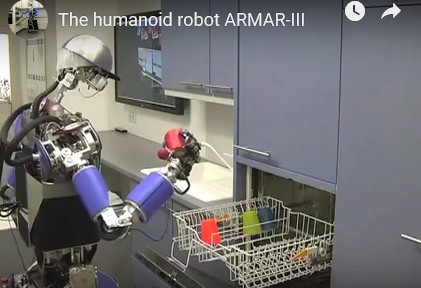JAHRESTREFFEN DES PLANETEN SCIENCE
Welche Rolle menschenähnliche Roboter in Zukunft in unserem alltäglichen Leben spielen werden - das erfahren wir beim Jahrestreffen des Planeten Science am Freitag, 28. Dezember 2018.

Foto: KIT
Das Team des Planeten Science rund um Moderatorin Angelika Peer, konnte einen hochkarätigen Speaker zum Thema "HUMANOID ROBOTS THAT ACT, LEARN, COLLABORATE AND AUGMENT HUMANS" gewinnen: Tamin Asfour ist Professor of Humanoid Robotics am KIT (Karlsruhe Institute of Technology) und forscht seit Jahren zu den Themen Künstliche Intelligenz und Robotics.
Wer an diesem spannenden Talk teilnehmen mag, ist herzlich eingeladen: Freitag, 28. Dezember 2018, 17:30 Uhr, Mediensaal der Athesia Druck GmbH im Weinbergweg 7, Bozen. Die Teilnahme ist kostenlos.
Hier ein paar Informationen zum Thema und zum Referenten:
HUMANOID ROBOTS THAT ACT, LEARN, COLLABORATE
AND AUGMENT HUMANS
Humanoid robotics has made significant progress
and will continue to play central role in robotics research, many applications
and in understanding intelligence. Engineering humanoid robots, which are able
to learn from humans and sensorimotor experience, to predict the consequences
of actions and exploit the interaction with the world to extend their cognitive
horizon remains a research grand challenge. The talk will introduce our recent
progress towards building integrated 24/7 humanoid robots able to perform
complex grasping and manipulation tasks in daily kitchen environments and
industrial maintenance tasks. In particular, I will show how learning from
human observation and natural language methods can be combined to build a
motion alphabet and robot internet of skills as the basis for intuitive and
flexible robot programming. I will discuss the vision of robot suits for every
human body and the transformative impact of humanoid robotic on other research
areas and application fields. As a result, humanoid robots will become 24/7
wearable companions for augmentation or replacing human performance in daily
and working environments, and humanoid technologies will contribute to
personalized rehabilitation in medicine, human support and protection in
human-made and natural disasters.
Zu diesem Thema referiert TAMIM ASFOUR:
Tamim Asfour is full Professor of Humanoid
Robotics at the Institute for Anthropomatics and Robotics, High Performance
Humanoid Technologies at the Karlsruhe Institute of Technology (KIT). His
research focuses on the engineering of high performance 24/7 humanoid robotics
as well as on the mechano-informatics of humanoids as the synergetic
integration of mechatronics, informatics and artificial intelligence methods
into humanoid robot systems, which are able to predict, act and interact in the
real world. In his research, he is reaching out and connecting to neighboring
areas in large-scale national and European interdisciplinary projects in the
area of robotics in combination with machine learning and computer vision.
Tamim is the developer of the ARMAR humanoid robot family. Tamim is scientific
spokesperson of the KIT Center “Information · Systems · Technologies (KCIST)”,
president of the Executive Board of the German Robotics Society (DGR) and the
Founding Editor-in-Chief of the IEEE-RAS Humanoids Conference Editorial Board.
www.humanoids.kit.edu
Anmeldung: jahresevent.suedstern.org